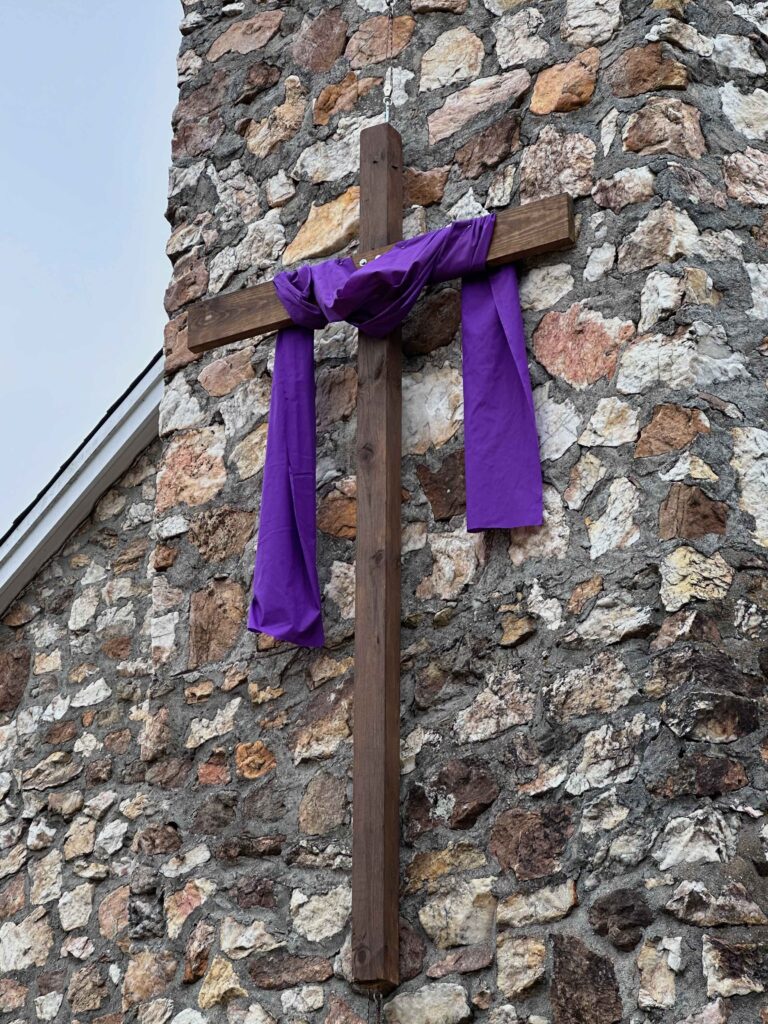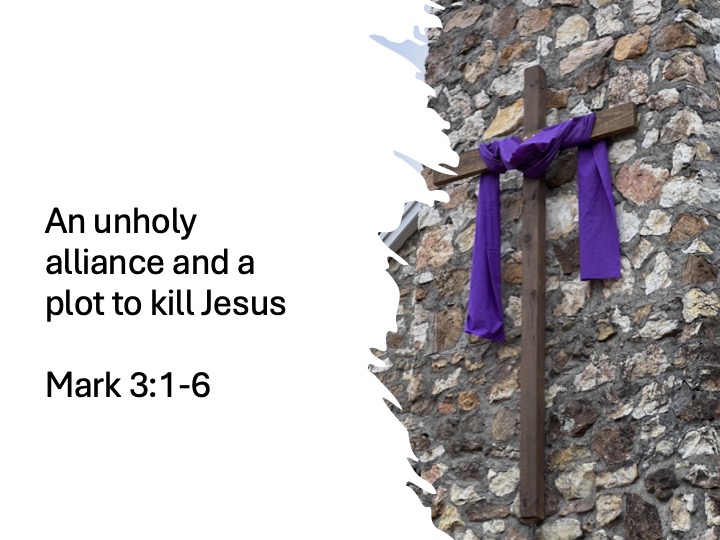Jeff Garrison
Bluemont and Mayberry Churches
March 10, 2024
Mark 3:1-6
At the beginning of worship:
In the opening part of his book, Losing Our Religion, which I reviewed in my blog this past week, Russell Moore talks coming of age in the church during the 1980s. He was told not to “conform to the pattern of the world,” except, it seemed to him when “the world’ was the remnant outpost of the Confederate States of America.”
The cynical side of Moore wondered “if the gospel was just a way to mobilize voters for party bosses or to fund prostitutes and cocaine for preachers on television.” Remember all those scandals in the 80s? Thankfully, with the help of the writings of C. S. Lewis, Moore recovered from his cynicism and saw a different side to the church. This church “spans heaven and earth, time and eternity, awesome as an army with banners.”[1]
Twain and rascals in the ministry
There have always been reasons to be cynical about religion. In a newspaper article in the Virginia City, Nevada’s Territorial Enterprise, a young Mark Twain noted that “a man’s profession has little to do with his moral character.” He went on to say, “If we had as many preachers as lawyers, you would find it mixed as to which occupation could muster the most rascals.”[2]
The production of “rascals” among the religious elite is nothing new. It was going on during Jesus’ time. We must capture a vision of the church such as the one by C. S. Lewis, with its banners flying throughout history. Yes, the church will often disappoint us, but our Savior, Jesus Christ, remains faithful and still uses the church, as broken as we often are, to fulfill his mission in the world. There’s good news in this.
Before reading the scriptures:
Throughout the second chapter of Mark’s gospel, Jesus’ popularity has grown as has the opposition toward him. It reaches a climax in the beginning of chapter three.[3] Jesus is back in the synagogue on the Sabbath. We’re not told where, but perhaps he’s still in Capernaum. Again, Jesus faces a dilemma. Does he heal a man on the Sabbath? Or is there something else going on here?
Sabbath laws
The Sabbath laws by the time of Jesus were complex. If someone was in immediate need of medical attention, it could be provided. First aid was okay. You could prevent a wound from becoming worse. But you were not allowed to heal. You could stop bleeding because the person might bleed to death. If life was in danger, you could act. Otherwise, the Sabbath was to be upheld. You were not even allowed to set a broken bone. That had to wait because it was not considered life-threatening.[4]
The Conflict
In our story this morning, there’s a man with a withered hand. People look at Jesus, wondering what he’ll do. Of course, Jesus takes pity on the man and acts. This leads to another conflict with the Pharisees.
The Pharisees see Jesus as such a threat, they are now willing to join forces with their enemies to defeat Jesus! Religious extremism often leads to violence. When someone thinks they are “doing God’s work,” it is easy to justify any means to obtain the desired end. Of course, if God is truly Almighty, God doesn’t need us to compromise our morals to save his reputation. God can take care of himself.
Read Mark 3:1-6
Our passage today ends Mark’s rapid-fire telling of stories of Jesus in action. Since the first chapter, we have heard only a little of Jesus’ teachings, and most of that we saw last week, at the end of the second chapter where Jesus answered the challenges of the Pharisees. Instead, we have seen Jesus as a man of action. He cast out demons, heals many people including a leper and paralyzed man. Mark has one more story.
Man with a withered hand: Was Jesus set up?
Again, Jesus is in the synagogue and it’s on the Sabbath. A man appears with a withered hand. I almost wonder if the man was there on the Sabbath as bait, to tempt Jesus to act. Mark creates tension in the story as he speaks of everyone watching to see what Jesus does. Otherwise, the man might hide his hand from the crowd and from Jesus. But we know nothing of his thoughts.
Jesus, of course, understands this is a trap. In our last vignette of Jesus, we heard him teach the propose of the Sabbath, while claiming himself to be lord over the day. The Sabbath was made for humanity, not the other way around, Jesus said. The tension in the synagogue is tense. What will Jesus do?
Jesus’ questions
Jesus begins by inviting the man with a withered hand forward. “What kind of action suits the Sabbath best,” Jesus asks. “Doing good or evil?”[5] Should we save or kill?
1st Century Sabbath Laws
As I pointed out, from a strict understanding of the Sabbath, healing this man goes against tradition. He could be healed on the next day, and no harm would be done. The man isn’t in a life-or-death situation. Certainly, his hand diminishes his life, making it harder from him to earn a living, but people do get along with only one hand all the time. Yet, I’m sure the man would appreciate his hand healed as early as possible.
Another question to ponder is if Jesus is really breaking the Sabbath here. While he heals the man, he doesn’t do anything. He doesn’t mix up any herbs or makes some kind of ointment. He doesn’t even massage the hand. Jesus just asks the man to reach out and as he does, his hand is healed. Perhaps, the real anger at Jesus isn’t for breaking the Sabbath but drawing out the hypocrisy of the Pharisees.[6]
Jesus’ anger at hardened hearts
Jesus’ questions remain unanswered. He becomes angry because he realizes how hard their hearts have become. They care nothing about the man, only about trapping Jesus in a compromised position in which they can show he has violated one of their laws. It grieves Jesus for people to be so uncaring. But Jesus also has compassion and invites the man to stretch out his hand and as he does, it’s healed.
Plot against Jesus
The Pharisees have now seen or perhaps heard enough. They go out and conspire with the supporters of Herod on ways to kill Jesus. From here on out, Mark has Jesus walk in the shadow of the cross.
Pharisees and Herodians: An Unholy Alliance
Let me say a few things about this unholy alliance. First, the Pharisees supposedly hated all that wasn’t pure, especially a Greek culture brought into Palestine by Roman occupiers. They wanted a Messiah to sit on David’s throne and who would thumb his nose toward Rome.
While there is some question as to exactly who the Herodians were, it’s obvious they were supporters of the half-Jewish king, Herod the Greek, along with the puppet kings and rulers in the following generations. The Herod dynasty, while nominally Jewish, made peace with Rome. After all, they owed their rule to the Empire. This was totally against the Pharisees, who were strictly kosher. They avoided anyone who had anything to with gentiles.[7]
What causes someone to violate their own principals? What causes someone to think winning is so important that any means can be used to achieve victory? Jesus’ death and resurrection shows us that might does not make right. As Paul tells the Corinthians, God uses the weak and the foolish to show the impotency of human power.[8] When the Pharisees finally got their wish and had Jesus crucified, they quickly learned the mistake they’d made. The risen Jesus proved far more powerful than the rabbi from Galilee. But that’s getting ahead of our story.
Who’s the one violating the Sabbath?
The second irony to the Pharisee’s plan, if we take Mark literally, is that they are the ones breaking the Sabbath. They go out and immediately plan for Jesus’ demise. Notice that word, immediately, one of Mark’s favorite terms. We can imagine them leaving the synagogue in a huff and meeting in the parking lot as they talk over what to do.[9] So much for the sanctity of the Sabbath, using the day to plan a murder.
The Pharisees show the human tendency toward hypocrisy. They portray themselves as so pure but are willing to do what it takes to gain what will become a short-term victory. And, almost unaware of their actions, they break their own laws. They lack integrity. They lack character. And we should admit that on occasion, we join their club. After all, none of us are perfect. But we should be careful and when we fail to live up to our calling, be willing to confess and to repent of our sin. For our hope is not in our victory, but in Jesus’ victory. Our hope is grounded, not in this life, but in the life to come by the one who shows us the way.
It’s always easier to point out someone else’s sin
The Pharisees found it easy to point out what they saw as Jesus’ shortcomings. We’re the same way. It’s easy to point out the sins of others. But we must remember that Jesus accepts us as we are and invites us to follow him. Doing so means we must, as he taught in the Sermon on the Mount, cleanse our own eyes before we go trying to clean someone else’s eyes.[10] We need to search our own hearts and find out where we’ve been hypocritical, and then confess our failures to God as we trust in God’s mercy as shown in Jesus Christ. Amen.
[1] Russell Moore, Losing Our Religion, (Sentinel/Penguin Random House, 2023), 32-33.
[2] I found this quote was found in Henry Nash Smith, ed., Mark Twain of the Enterprise: Newspaper Articles and Other Documents, 1862-1864 (Berkeley: University of California Press, 1964), 60. It is quoted in my article, “Of Humor, Death, and Ministers: The Comstock of Mark Twain,” Nevada Historical Society Quarterly,#38,3 (Fall 1995), 199.
[3] Morna D. Hooker, The Gospel According to Saint Mark (1991, Hendrickson Publishers, 1997), 105.
[4] James R. Edwards, The Gospel According to Mark (Grand Rapids, MI: Eerdmans, 2002), 98-99.
[5] I am using the words here from The Message translation.
[6] Douglas R. A. Hare, Westminster Bible Companion: Mark (Louisville, KY: W/JKP, 1996), 44.
[7] Edwards, 101-102.
[8] 1 Corinthians 1:25.
[9] Hooker, 108.
[10] Matthew 7:1-5.


